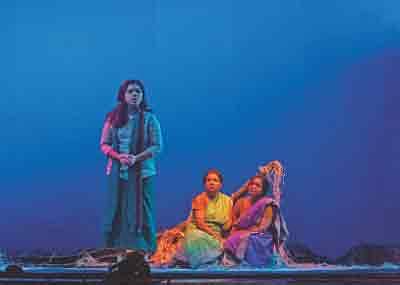Bideha: Agonies of war victims

The play features inter-connection among three war-torn women. Photo: Jamil Mahmud
Featuring agonies of two Biranganas (women who survived abuse during the Liberation War), a new play premiered on Dhaka stage. National Theatre Repertory brings the play, “Bideha”, directed by Lucky Enam. The play premiered at the National Theatre Hall, Bangladesh Shilpakala Academy, on September 3.
Young playwright Shahman Moishan's story follows Birangana Halima and Shantikumari (played by Lucky Enam and Momena Chowdhury respectively) who share their agonies with each other, as both have endured trauma and lifelong stigma. Living by the river Meghna, the women only wish to die peacefully.
The all-female production introduces another character, a young non-resident Bangladeshi who is a war child (played by Jyoti Sinha).
Through bringing this third character, the playwright tries to build a bridge between two generations.
A representative of the post-war generation, the young girl admits that she has no country as internet or the virtual world is her realm. She didn't come here to seek her roots, but rather to discover all corners of the globe and study people and to write about them on her blog.
This third character tries to communicate with the Biranganas, to understand them.
Lucky Enam's directorial approach seemingly emphasised on expressions of emotions; at times the expressions didn't seem restrained or subtle. Her direction also varied somewhat from what the synopsis (on the brochure provided by organisers) read. According to the text, Halima's death is suggested but the staged play depicted the three women getting together and hoping for a better future.
Sudip Chakroborthy's set and light aptly created a rural ambiance. Use of bluish light on the backdrop as well as rural elements from daily life as props helped to create the ambiance.
Kamruzzaman Roni did the music.
Prior to the premiere of the play, a discussion was held. Advocate Pramod Mankin, State Minister for Cultural Affairs; Liaquat Ali Lucky, director general, Bangladesh Shilpakala Academy and Lucky Enam, among others, spoke at the discussion.
After “Target Platoon” and “Rudro Robi O Jalianwalabagh”, this is the third such production by National Theatre Repertory, which seeks to create a platform for theatre activists with a professional attitude.

 For all latest news, follow The Daily Star's Google News channel.
For all latest news, follow The Daily Star's Google News channel. 



Comments